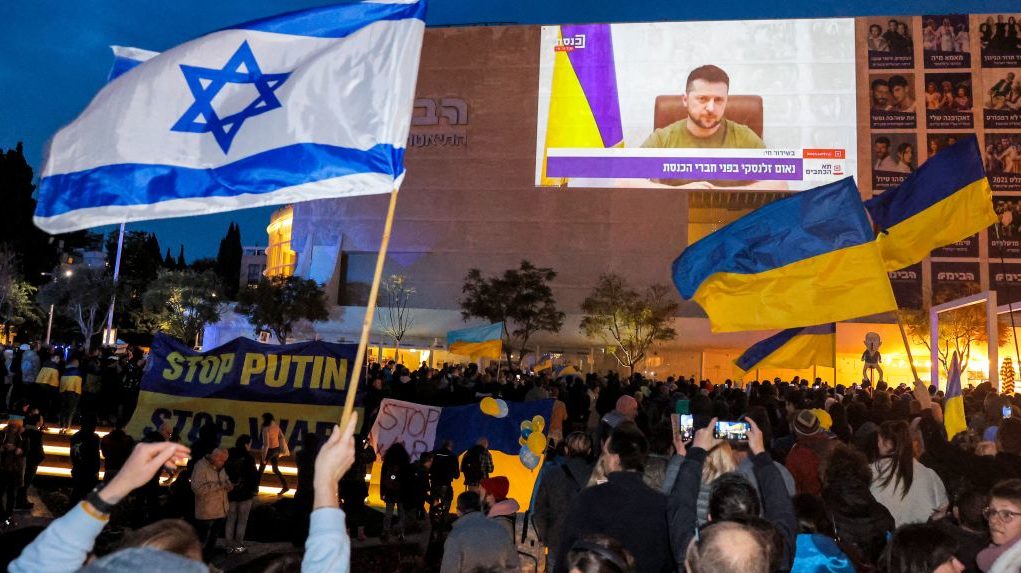Dennis Ross to TML: Israel’s Stance on Russia-Ukraine War Is Balanced
But former Mossad head Tamir Pardo calls Israel’s refugee policy ‘a disgrace,’ compares it to Switzerland during Holocaust
Israel has managed to strike a balance in its position on the Russia-Ukraine war but could be doing more to help the Ukrainian people, former US envoy to the Middle East, Ambassador Dennis Ross, said.
The international community has repeatedly called on Israel to abandon its neutrality and take a stand against Russia, but so far Israel has refused to send arms to Ukraine or to impose sanctions on Moscow.
“The Israelis have adopted a position that is balanced; by that I mean you see that the foreign ministry has adopted a position that is quite critical of what the Russians are doing, while the prime minister has adopted a position that is more careful and more nuanced,” Ross, a counselor and the William Davidson Distinguished Fellow at the Washington Institute for Near East Policy, told The Media Line.
“Israel is not the one that invited the Russians to create a military position on their border so they have to contend with that,” he added.

Ambassador Dennis Ross, counselor at the Washington Institute for Near East Policy and co-chair of the Jewish People Policy Institute (JPPI). (Maya Margit/The Media Line)
One of the reasons that Israel is treading lightly vis-à-vis Russia is because of the latter’s presence in Syria and ongoing military coordination with the IDF. Israel has carried out strikes in Syria against Iranian targets, which move advanced weaponry to Hizbullah in Lebanon and within Syria itself.
“In addition to advanced weaponry they want to put precision guidance on top of the tens of thousands of rockets that have been provided to Hizbullah,” Ross said. “Israel can’t live with that so Israel has to be able to blunt the Iranian effort. The Russians, given their air defense, could make it very difficult if not impossible for Israel to do that.”
Nevertheless, Ross conceded that Israel could be doing more to help Ukrainians, especially with passive defensive items and additional medical assistance.
The diplomat’s statements came on the sidelines of a conference that was held at the Jewish People Policy Institute (JPPI) in Jerusalem this week, which saw officials and scholars discuss Israel’s moral considerations in relation to its foreign policy decisions.
Israel’s Refugee Policy a ‘Disgrace,’ Says Former Mossad Head
Give the gift of hope
We practice what we preach:
accurate, fearless journalism. But we can't do it alone.
- On the ground in Gaza, Syria, Israel, Egypt, Pakistan, and more
- Our program trained more than 100 journalists
- Calling out fake news and reporting real facts
- On the ground in Gaza, Syria, Israel, Egypt, Pakistan, and more
- Our program trained more than 100 journalists
- Calling out fake news and reporting real facts
Join us.
Support The Media Line. Save democracy.
Since the Russian invasion first began more than 100 days ago, Israel has delivered humanitarian aid and also operated a field hospital in Ukraine. After months of hesitating to do so, Jerusalem in May also agreed to send the war-torn country 2,000 helmets and 500 flak jackets.
Many inside and outside of Israel have criticized these as half-measures and called on the government to take a firmer approach, and also to fully open its doors to non-Jewish Ukrainian asylum seekers.
According to a report released on Tuesday by the Knesset’s Labor and Welfare Committee, 14,528 Ukrainian refugees who are not eligible under Israel’s Law of Return are currently residing in the country. Overall, some 32,000 Ukrainians have entered the country since the beginning of the war.
Israel capped the number of non-Jewish Ukrainians that are eligible to enter the country shortly after the war began. Interior Minister Ayelet Shaked said the state would temporarily welcome 20,000 Ukrainian citizens that entered the country before the war, and that another 5,000 would also be allowed in.
At the JPPI event, former Mossad director Tamir Pardo called the policy a “disgrace.”
“Regarding refugees, Israel is unfortunately not very far from Switzerland and the way it behaved during World War II,” Pardo, who was recently appointed co-head of the JPPI’s geopolitics program, told those in attendance. “The door is open for Jews whose Judaism is not in doubt under the Law of Return. For those that are not Jewish, Israel has created difficulties and, up until now, has not opened its doors to all asylum seekers.

Former Mossad director Tamir Pardo (standing, left) addresses the Jewish People Policy Institute conference in Jerusalem on June 7, 2022. (Maya Margit/The Media Line)
“Asylum does not mean granting citizenship, a passport, an Israeli ID card or the right to run for Knesset,” he continued. “Is it hard to open the doors ? In my eyes it’s a disgrace.”
Pardo also said that Israel should be willing to provide the Ukrainians with defensive weapons.
Others at the event agreed.
“I think the Israeli government is basically choosing not to make too much noise and to go in the rain without [getting] wet,” Professor Yedidia Stern, president of the JPPI, told The Media Line. “I personally feel that we can do much more for the Ukrainian people. I think it’s our obligation as a Jewish state.”
This week, Ukraine’s ambassador to Israel, Yevgen Korniychuk, told reporters that Kyiv is frustrated by Israel’s repeated refusal to provide Ukraine with the Iron Dome missile defense system and other defensive weapons.
Deploying Iron Dome in Ukraine would be a difficult feat to achieve, a military expert told The Media Line.
“To supply the Iron Dome means that you have to supply it with a battery of Israeli soldiers,” Col. (ret.) Miri Eisin said. “Has any other country in the world put their soldiers on the ground in Ukraine? It isn’t just the Iron Dome – it’s a very sophisticated system that takes 12-18 months to train on.”
The war between Russia and Ukraine has dragged on for over 100 days. As casualties mount and international pressure ramps up, Israel may eventually find itself getting pushed off the fence.
Aron Rosenthal, a student at the University of Edinburgh and an intern in The Media Line’s Press and Policy Student Program, contributed to this report.



